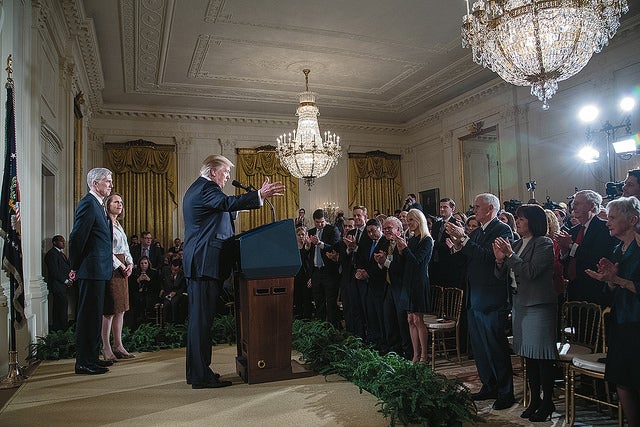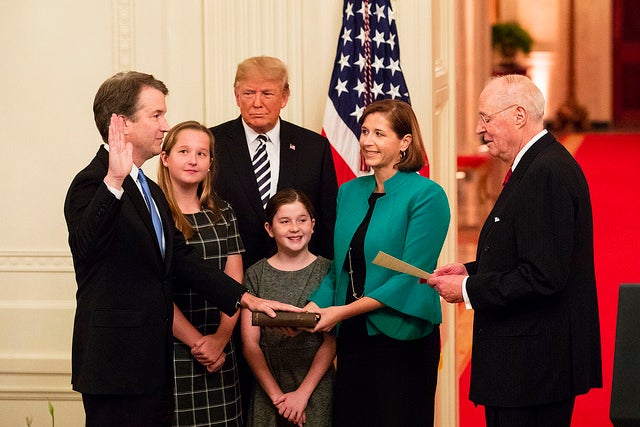Trump’s Record on Judges Is the Best Ever, Says Jeff Sessions
Rob Bluey /
Attorney General Jeff Sessions spoke to The Daily Signal this week about the role of the judiciary and President Donald Trump’s appointing judges who respect the U.S. Constitution. “No president has ever done a better job than he has in putting good people on the bench,” says Sessions. An edited transcript of the interview is below. Full audio of the interview is available on The Daily Signal Podcast.
Rob Bluey: You’re at The Heritage Foundation’s President’s Club meeting to talk about the Founders’ vision for our government and the role of the judiciary. I want to begin by asking you about one of President Trump’s accomplishments, which is the appointment, so far, of 84 federal judges. Of course, that includes two Supreme Court justices, Neil Gorsuch and Brett Kavanaugh. What are the characteristics of these judges?
Jeff Sessions: First, they’re both men of high integrity and extraordinary intellect in legal skill. With proven records on the bench of restraint, wisdom, and a lack of real controversy in what they’ve done. They’re traditional jurists who believe that judges serve under the Constitution, under the laws of the United States, they’re not entitled to just redefine the meaning of the words of the Constitution to make it say what they want it to say today.
If we head down that road, then the entire future of our country is weakened and darkened. We just cannot allow it to happen. The courts have been a central struggle for the country. And we’ll have at least a modest majority, it looks like, who agree with former Attorney General Ed Meese on originalism. That judges should normally and should always, really, try to interpret the meaning of a statute on what the words meant when they were adopted. Otherwise it becomes political.
So I think it’s a huge thing. We’re feeling it in the circuit courts of appeals. I believe he’s appointed 29 Court of Appeals judges who’ve been confirmed, are on the bench. We can feel a difference in some of the circuits already.

Then-Judge Neil Gorsuch and his wife, Louise Gorsuch, stand by as President Donald Trump announces Gorsuch’s nomination to the Supreme Court on Jan. 31, 2017. (Photo: Shealah Craighead/The White House)
Bluey: You say in your remarks that, “The Founders did not establish the federal judiciary to be the final arbiter of all things, all questions in our society.” But that doesn’t seem to be the case today.
Sessions: It is really astounding and, truthfully, if we could get the cases to the Supreme Court, we wouldn’t have that much. But there’s 600 federal district judges. Many of them were appointed by President Obama, for example, who said flat out he wanted judges who would show empathy. Whatever empathy is, it’s not law. It means he wants judges who don’t follow the law, who follow their emotions or some political vision that they might have. That is wrong.
President Obama … said flat out he wanted judges who would show empathy. Whatever empathy is, it’s not law.
So the plaintiffs are picking these cases, taking them to districts where they have the greatest chance to get an activist judge. And if it’s in the 9th Circuit, as you know, it’s a very liberal, activist circuit, and you have to go all the way to the Supreme Court to reverse one of these rulings. And it takes a year, or more sometimes, to get the case that far.
It’s maddening to me, I’ve got to tell you, it’s an entirely frustrating. … I know it frustrates the president, but it frustrates me. And we are working every way possible to expedite these cases, to overrule and to get overturned the rulings that block the lawful execution of governmental functions.
Bluey: One of the things that you also talk about in the speech are nationwide injunctions. For the first 175 years of our nation’s history, we didn’t have a single federal district court judge issuing these. But President Trump has had 27 in his not even two years in office. What’s happened?
Sessions: It’s become a weapon almost. I hate to say it, but I think some judges have lost their discipline, are hostile to the president’s agenda, and are going out of their way to frustrate it. We’ve had some success on appeal, we expect to have more. But this costs money, it delays the effective actuation of a government policy, that’s important.
I think some judges have lost their discipline, are hostile to the president’s agenda, and are going out of their way to frustrate it.
For example, I don’t think that most people know that we got an emergency review by the Supreme Court of the so-called travel ban case that went up. It had been constricted dramatically and ordered blocked by several district judges around the country. Well, the Supreme Court struck down almost all of that. And 90 percent of it, I guess, is in effect now.
People probably think it’s still being blocked and that somehow the president and the Department of Justice was wrong, but we’ve won, at least initially at this point on the travel ban type case.
But boy, it’s been frustrating.
Bluey: You mentioned the term “activist judge.” What makes a good judge? What makes an activist judge? How do you draw those distinctions?
Sessions: I think a good judge is the way Chief Justice [John] Roberts described it. He is a neutral umpire who calls balls and strikes and does not take sides in the game. A good judge, whether they’re Republican or Democrat, should consistently come out with the same conclusion on most cases. And that’s what we want.
It cannot be that we judge judges on their politics, their ideology, their religious ideas, or whatever. You judge them on whether or not they’re good jurists, who can read a law and dispassionately render a fair ruling.

President Donald Trump looks on as Anthony M. Kennedy, retired Supreme Court justice, swears in Judge Brett Kavanaugh to be the Supreme Court’s 114th justice on Oct. 8. Kavanaugh is joined by his wife Ashley, holding the Bible, and their daughters Liza and Margaret. (Photo: Joyce N. Boghosian/The White House)
Bluey: As a former senator, you abided by the Constitution and the advice and consent clause when the Senate confirms judges. Has that process become too political?
Sessions: I strongly believe that this personal attack, dishonest attacks on good people, like Judge [Brett] Kavanaugh, is out of bounds. When I was the ranking Republican on the Judiciary Committee and Justices [Elena] Kagan and [Sonia] Sotomayor came up, we challenged them and we urged them and went after their legal philosophy.
I would say that you have little to fear from a judge who’s restrained, who follows the Constitution. What’s dangerous is when you get a judge who thinks like an activist.
We never attacked them personally. This is completely excessive, in my view. The American people are upset about it, and they should be. So, that’s out of bounds.
I would say that you have little to fear from a judge who’s restrained, who follows the Constitution. What’s dangerous is when you get a judge who thinks like an activist. And there’s an intellectual school for this. It’s not something they had particularly and when they redefine words to make it say what they want it, then that becomes dangerous.
I think if they are too untethered from the language of the Constitution, and they don’t feel bound by it, they are disqualified for being a judge. You just simply have to believe in law and you have to believe in objectivity.
One of the nominees came forward and had a speech, repeated it quite a number of times, the same speech, saying that there is no objectivity, just a series of perspectives. Well, I question whether a judge who believes that could ever be a good judge.
Bluey: You cite an example in your speech, which I want to ask you about, in which there was a DACA [Deferred Action for Childhood Arrivals] immigration case and a judge told one of your Justice Department litigators, “You can’t come into court to espouse a position that is heartless.”
Sessions: And who defines what’s heartless?
I mean, the law says certain people are not entitled to come into the country. Our law officers, thousands of them out there on the border, struggling every day to follow the law and stop people. Are they supposed to say, “Well, you look sad today, I can’t enforce the law.”
Whatever empathy is, it’s not law. It’s dangerous. It’s politics.
What I would say, that reflects is a logical extension of President Obama’s theory that a judge should display empathy. Whatever empathy is, it’s not law. It’s dangerous. It’s politics. It’s something other than law.
America is founded on law. Empathy can impact a person in so many ways, but a judge has to rule on the facts honestly and objectively.
Bluey: I know this is an issue that our Daily Signal audience cares passionately about. There are about 118 vacancies in federal courts right now. And we’ll certainly be keeping a close eye on those judges as they come before the Senate for confirmation.
Sessions: It’s so important. And one of the great things President Trump is doing, I got to tell you, is moving forward great judges. And these judges, from the district courts to the circuit courts to the Supreme Court, are just so high quality. And I think good, traditional, legal thinkers. … No president has ever done a better job than he has in putting good people on the bench.
